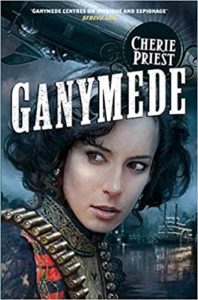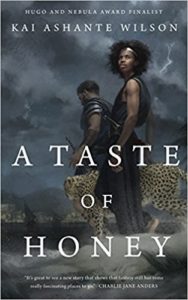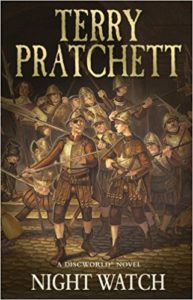Ganymede, the third of Cherie Priest’s five Clockwork Century novels, follows the efforts of some free people of color to tip the scales of the American Civil War, ongoing for more than 20 years at the time of the book’s events, in favor of the Union by bringing it an experimental Confederate submarine that sank in Lake Ponchartrain. Of course there are obstacles: the Ganymede itself is at the bottom of the lake; when it was operational, it had a tendency (like real Civil War submarine prototypes) to kill its own crew as readily as any enemy forces; New Orleans is a Confederate city, although the Republic of Texas takes care of most of the occupation; the Union’s new aircraft carrier (zeppelins, this is alt-history among other things) is stationed off the Louisiana coast and willing to receive the Ganymede but can’t hang about forever; nobody really knows how to pilot a submarine. Not to mention the zombies.

Josephine Early, brothel owner and a leader of the enterprise to raise the Ganymede and bring it to the Union, believes she has a solution to the pilot problem: Andan Cly is an airship captain and an old flame of hers. She believes that a submarine is more like an airship than anything else. Captain Cly might have just the right combination of derring-do, foolhardiness and lingering regard for her to take on the job that numerous others have turned down. Cly is presently based in Seattle, a settlement with its own considerable zombie problem, as detailed in the first two Clockwork Century novels, Boneshaker and Dreadnought.
In the world that Priest has set up, an experiment gone wrong in Seattle unleashed a mysterious gas, Blight, that turns humans into zombies and has unpredictable effects on other wildlife. To contain the Blight, the people who survived the initial onslaught built an enormous wall around the center of town. Distilled essence of the Blight yields a powerful intoxicant and stimulant, generally known by the street name of “sap.” Sap, in turn, is much in demand among soldiers in the war, casualties, and others willing to play around with their consciousness regardless of the price. Captain Cly has previously run sap to the east and supplies back to Seattle, but he has become uneasy with the bargain and is trying to go more or less straight.
Early’s telegram, vaguely seeking help, catches him at an opportune moment. He is willing to come to New Orleans with his ship and crew, and find out what Early wants from him.
Of course things do not run like clockwork. An unfortunate encounter between an important Texian officer and a delegation from the local zombie population leads to lots more military attention from the Republic than the would-be sub smugglers prefer. Early’s brother is seriously wounded in a firefight that was bad enough before the Texians sent in reinforcements. (One of the field doctors in this novel is Leonidas Polk. In Ganymede, he’s a washed-up Union man, and a drunk. In our timeline, Polk was an Episcopal bishop, a Confederate general, and a principal founder of my undergraduate alma mater. Encountering this version of him is deeply weird.)
Soon, Early and her allies along with Cly and his crew are racing time and Texas to try to bring the Ganymede from the lake to the Mississippi River, and thence to the sea. It’s an adventure almost without pause, told with style and verve. One of the best aspects of the novel is that Early and Cly split because neither could yield to the other, at least not enough to make a life together. Working together in a fraught and secret, neither of them finds it any easier than before to let the other take the lead. As Priest handles their conflicting tendencies, both characters remain true to themselves and work their way toward resolution, or at least accommodation. This relationship could easily have fallen into cliché, but in my view did not.
The rest is good, solid adventure writing. Readers learn a bit more about how the world of the Clockwork Century works; Priest lets on about how there are coming to be zombies in places other than Seattle; Marie Laveau has a couple of guest appearances and teaches Early a little bit of zombie lore. There are spies, there may be betrayals, there are certainly fireworks. Ganymede promises a taut tale in a strange nearby world, and delivers.






